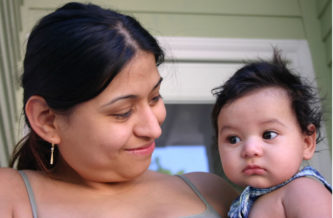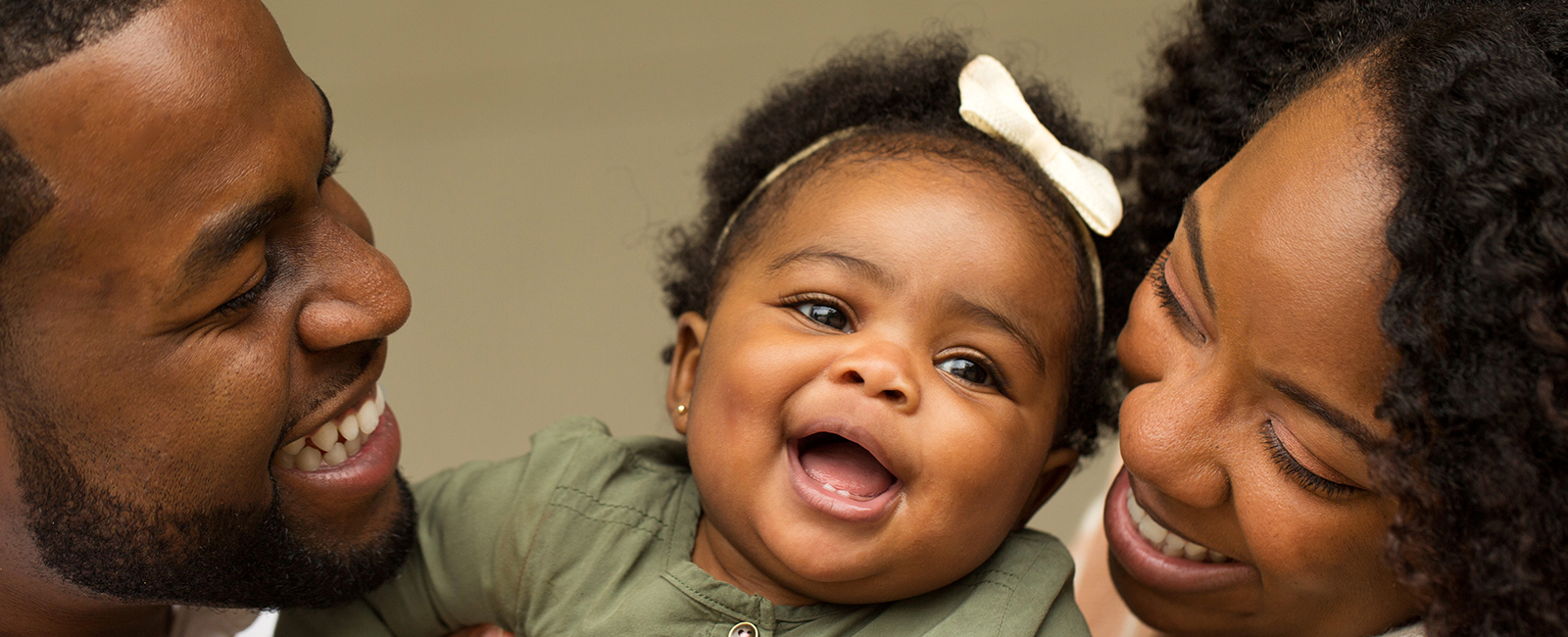NVFS Programs Work Together to Assist a Family in Need
Well-Being
Bringing home a new baby, especially her first, is often the happiest moment of a mother’s life. Even in families with a history of trauma, who live in poverty and have little support, Healthy Families staff typically experience moments of joy between new parents and their babies during the first home visit in the program. However, in 2011, this was not the case for a young mother enrolling in Healthy Families Prince William.
Abby* had just given birth to her first child. While Abby was in the hospital delivering, her grandmother, whom she lived with, passed away. Abby never got to say goodbye to her grandmother, who was like a mother to her, and she and her son had nowhere to call home. In desperation, Abby reached out to her mother and asked to move in.
Abby was 21 and a single mother of a newborn. She never completed high school and had just lost her main source of support. She would stay in her pajamas all day and cry, and couldn’t bear to hold her new baby for the first two weeks he was home.
With the support of Healthy Families, Abby has made significant improvements to her and her family’s life. She rekindled her relationship with her son’s father, and they went on to get married and have two more children. Abby got her general equivalency diploma (GED) and maintained employment when she was able to work.
New Challenges
Although Healthy Families support has been key to the family’s success and continued perseverance through adversity, the collaboration among NVFS programs and community has been critical in the family’s ability to continue to rise above the challenges they face.
Most recently, the family struggled as they learned their third son had a rare disorder that caused the brain to stop developing at 6 months in-utero. The child was born with severe cognitive and physical disabilities and, at 5 months old, was still in the hospital.
Abby and her husband couldn’t bring the baby home because they were still living with her mother. Abby, her husband and two other sons all shared one bedroom in her mother’s house, which was filled with smoke, frequented by drug users and had an aggressive dog. Their car had recently broken down and they couldn’t afford to fix it. This prevented the family from visiting their new son in the hospital and almost resulted in them losing custody of the baby to the state.
Abby was overwhelmed, suffering from depression and had low motivation. She was ready to give up when Healthy Families referred her to a mental health counselor for the program.
The Healthy Families mental health counselor helped Abby process her feelings and fears about caring for a child with intensive medical needs. The counselor was also proactive in reducing the severity of Abby’s symptoms of depression. Abby’s visits to the hospital increased, as well as her confidence for caring for her baby. Healthy Families staff advocated for the family at the hospital, and the hospital social worker assisted Abby in getting the appropriate medical training and found a temporary placement for the child as the family worked to obtain appropriate housing, a reliable car and training.
Housing
Abby’s Healthy Families counselor and home visitor worked hand-in-hand in assisting her family to find a clean, safe home. Healthy Families linked them with a private donor and resident in Manassas who was able to pull together furniture, food and basic household items for the family’s new home. The boys were thrilled to have their own bedroom and a safe, smoke-free place to play.
Adopt-a-Family Program
Although the family had enough money to move into their new apartment, money was tight over the winter months; Abby’s husband worked a seasonal job, and the family was stressed about not being able to cover rent until work picked back up. Healthy Families staff worked with NVFS’s Adopt-a-Family program to pre-pay four months’ of rent and pay for some much-needed dental care for Abby. The completion of Abby’s dental care helped boost her self-esteem and gave her more confidence to bring home her new baby. She was no longer ashamed to smile in public.
Vehicles for Change
Training and confidence, paired with an appropriate home, allowed the family to bring home a baby with intensive medical care. They were just needed a vehicle to bring their baby home in. The last step was linking the family to Vehicles for Change, another NVFS program, where they were able to use their earned income to purchase a reliable vehicle.
Today the family lives together in their two-bedroom apartment. They also have a minivan large enough for all five family members, the youngest child’s medical equipment and home nurse. The middle son has continued to attend preschool through NVFS’ Early Head Start (EHS) center in Manassas. Staff at EHS and Healthy Families are now working to enroll the family’s medically fragile child in the program so that when the oldest child — whose birth first linked the family with NVFS — enters kindergarten, Abby can return to work knowing her sons are all safe and cared for.
“In giving Abby the support, encouragement, education and links to services, NVFS has helped her come out her shell,” shares family support worker Lourdes Narvaez. “Her confidence shines brightly now.”
In addition to the assistance and impact of NVFS’ Healthy Families home visitors and mental health counselor, Adopt-a-Family, Vehicles for Change and Early Head Start, this family has benefited from private donors introduced to them by NVFS, holiday gifting programs and, in brief moments of unemployment, received food from NVFS’ Anti-Hunger Program. All of these programs working collaboratively have ensured this family never became homeless and were able to maintain custody of all of their children. The family is in a much better place today because of all the supportive programs and assistance given by employees at NVFS.
*Client name has been changed for confidentiality.

“In giving Abby the support, encouragement, education and links to services, NVFS has helped her come out her shell. Her confidence shines brightly now.” - family support worker Lourdes Narvaez


